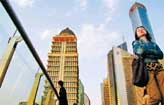View
The future is actually in the here and now
Updated: 2011-07-28 08:02
By Jules Quartly (China Daily)
Speeding into the future, we either adapt to living in the fast lane, or fall by the wayside. It's a kind of bleak, Darwinian way of looking at things, but it has a measure of truth and nowhere more so than in China, which is bubbling with change.
In some ways the challenges of the future are with us now, and I have a theory that contemporary Chinese culture may be one of the best ways of coping with it. It is this same culture, however, that often bamboozles and occasionally frustrates visitors.

For instance, forming orderly lines. This rarely happens. Take the subway and you may think you are doing the right thing by standing to one side of the opening doors and waiting for everyone in the carriage to leave first, as directed, but you will be left standing as those waiting on the platform squeeze past.
If you take the bus during rush hour, the situation is exacerbated by a factor of 10, and it will appear to the uninitiated like a battle for pole position and a seat.
Please, dear visitor, understand that this is just a pragmatic approach to the issue of getting the most people moving in the quickest possible way. It's not impolite. It's just this is a fast-paced country, and stragglers will be left behind.
Some visitors to China are completely fazed by the traffic rules, or what they imagine to be the lack of them. How shortsighted they are! Cars need to keep going. Otherwise, the traffic would be even worse. Yes, you have to be nimble and fit to cross the road, but this keeps everyone healthy and demands bravery and concentration.
Parking on a sidewalk or cordoned off area only shows how the average Chinese driver is able to make the most of space. This is a skill that will only be appreciated by outsiders when the rest of the world is so crowded there isn't any space left - in about 50 years at the current rate of increase in world population.
Service at a store: Visitors will be amazed at how many people the assistant can serve at the same time as dealing with your payment. Unfazed, the cashier will ring the register, take a credit card payment from someone else and answer various queries without batting an eyelid.
This just goes to show what great multi-taskers the Chinese are, undoubtedly an essential skill for the future. Take, for example, working on the computer. Who works on just one window? No, the more you can do at any one time, the greater your efficiency.
I can't tell you how many times, in a restaurant or at a bar in the West, I've been left hanging, my arm raised, my hope for service dashed. Dear visitor, we have voices, let's use them and just shout "fuwuyuan!!!" (waiter) as loud as possible. It's amazing. It works, and no one takes offence.
Voicemail. Gee. Don't get me started. Chinese don't use it and for good reason. It's a waste of money and time. And what is it with us Westerners and answering phones? Just pick the phone up. If you don't want to talk to someone, put it down, or even tell them where to go. Be honest. This is good advice.
Finally, fake goods. If you can't tell the difference, what's the problem? Chinese have worked this out. Someday, the rest of the world will learn to save hard-earned money this way.
As you can see from the above, Chinese are flexible and accept change. They're innovative, pragmatic and persevering - ideal characteristics to deal with the flux of progress.
I've seen the future, and it looks Chinese.


Specials

Turning up the heat
Traditional Chinese medicine using moxa, or mugwort herb, is once again becoming fashionable

Ciao, Yao
Yao Ming announced his retirement from basketball, staging an emotional end to a glorious career.

Financial sector short of talent
Lack of skilled professionals in Shanghai inhibiting the city's development as a financial hub